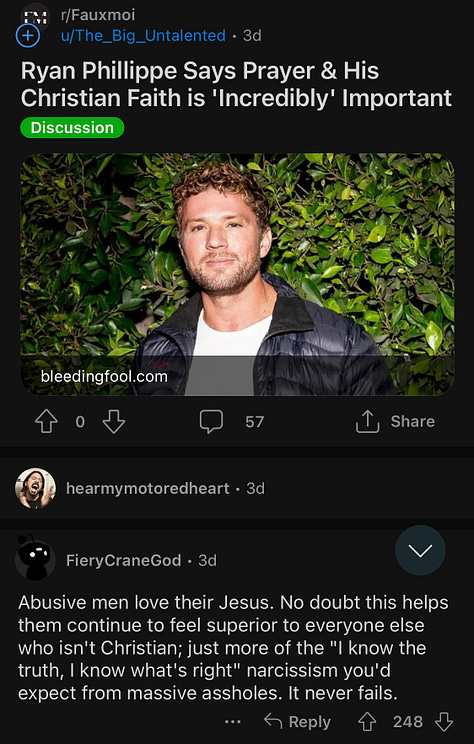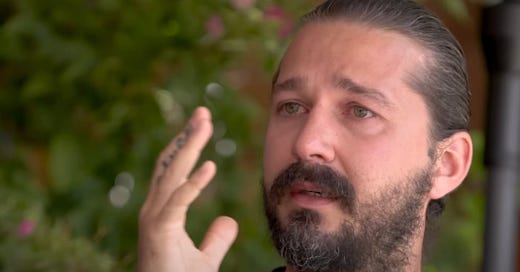Cancel Culture, Celebrity Conversions and Sainthood
How today’s culture eliminates the motivation for self-betterment
‘We are the angry mob
We read the papers everyday
We like who we like, we hate who we hate
But we're also easily swayed’
- The Angry Mob, Kaiser Chiefs
PART 1 - Cancel Culture.
Something I’ve noticed in recent years is the progression of binary thinking. Binary (or black and white) thinking is a cognitive distortion, and can be a symptom of mental illness of varying kinds. It’s when we think in absolutes; we are always right, or we are a terrible failure. Someone who sees the world as we do is our good comrade, or if they do not, are detestably immoral. Certain groups of people are all oppressed, whereas others are all oppressors. In reality, life so rarely fits into either extreme - the world and its inhabitants are full of grey and cannot be squeezed into a box, as convenient as that would be. Such simplistic distortions are apparent not only in the therapeutic space, but seem to be increasing in the wider culture and political discourse of today’s society, particularly among younger generations.
No longer is someone’s differing political opinion or religious belief something we can ‘agree to disagree’ on - it’s now some kind of threat - a moral evil, and this person must be treated with upmost hostility and scorn for daring to think in such a way. People seem committed to not only misunderstanding, but harshly condemning the ‘other’ to the point of dehumanising anyone who doesn’t think just like they do. I remember seeing the ‘Unfriend me if you voted Brexit’ posts on Facebook in 2016 (though this is something people of all beliefs and political persuasions can be guilty of). This sentiment certainly hasn’t lessened since, with the Culture War still well and truly ablaze.
I’m certainly not innocent of falling into the trap of moral elitism, but my own views have mellowed and changed dramatically over the years. To this end, I’ve found myself having sat on both sides of the political spectrum and thus feel I have some insight as to why each ‘side’ adopt the stances they do*. My friends don’t fit into one political bubble, and life tends to be more interesting that way as oppose to living in an echo chamber. But despite the push for ‘inclusion’ and ‘tolerance’ in today’s society, it seems acceptance for and curiosity about diversity of belief didn’t get the memo. You’re with us, or against us; the binary is clear.
*We’re culturally so ingrained into thinking in binary that ‘sides’ is how we see our politics - Left or Right. The irony of using these terms here isn’t lost on me!
Perhaps one of the most obvious displays of this binary thinking is in our treatment of celebrities. In an age of internet with the permanency of our online footprints, it’s now easier than ever to dig up the dirt on anyone with a public profile. People pour over social media accounts for hours, perversely determined to find politically incorrect comments or indications of guilt by association.



It’s incredibly easy to join the dogpile of vilification - all you need do is tap your screen a few times. Celebrities are not seen as real people; the best of us don’t imagine they’re impacted by or even take note of our comments (though sadly this isn’t always true). The worst of us hope they will be crushed, in a jealous urge to tear them down from the throne of social and financial prosperity; how dare they enjoy such privilege?!
This is its own kind of purity culture (which ironically, these very same people tend to assume is only attributable to religious zealots). Yes, when people do bad things they should be held accountable. Yes, they should apologise for their actions and do what they can to make amends. No one is disputing this, but it seems there’s now an obligation for the everyday person to be everyone else’s judge, jury and executioner. Not only this, but after the soul in question has been thoroughly wrung out to dry, they’re then left to rot in the ether with no chance of redemption. They’re tarnished, and let no one forget it!
When these people do accept the criticism that comes their way and admit to their wrongdoing, attempts to course-correct and better themselves are dismissed and sneered at as being insincere ‘damage control’.
It’s almost as if we feel we are the perfect adherents of our moral standards - as though somehow we don’t have skeletons in our own closets too. Perhaps that reality check would be too painful to acknowledge. I know I have things in my past that I feel shame for, whether this be in the things I’ve said, the way I’ve treated others or how I have treated myself. In some of these instances, I feel as though I didn’t know any better. In others, less so. I’m sure I’m far from the only person with moral failings in their history, though we seem to conveniently forget this when anyone (but particularly those who are not in our in-group) make a mistake, big or small.
We revel in being the people holding the pitchforks, to the point where there is some sense of actively wanting these people to be more evil than they are to confirm our own biases and assumptions.
“Suppose one reads a story of filthy atrocities in the paper. Then suppose that something turns up suggesting that the story might not be quite true, or not quite so bad as it was made out. Is one's first feeling, 'Thank God, even they aren't quite so bad as that,' or is it a feeling of disappointment, and even a determination to cling to the first story for the sheer pleasure of thinking your enemies are as bad as possible? If it is the second then it is, I am afraid, the first step in a process which, if followed to the end, will make us into devils. You see, one is beginning to wish that black was a little blacker. If we give that wish its head, later on we shall wish to see grey as black, and then to see white itself as black. Finally we shall insist on seeing everything -- God and our friends and ourselves included -- as bad, and not be able to stop doing it: we shall be fixed for ever in a universe of pure hatred.”
- C.S. Lewis, Mere Christianity
There is perhaps no better example of this than in the rise and fall of actor Shia LaBeouf.
PART 2 - Celebrity Conversions.
No stranger to fame and fortune, Shia LaBeouf became a household name from a young age. At a mere 10 years old he began performing Improv, after which he joined the cast of Disney’s ‘Even Stevens’ in the early 2000s. Shia’s success didn’t end there - he was soon an alumnus of the Hollywood Elite, acting in big-budget films including Transformers, Indiana Jones and Fury (to name a few).
Despite his celebrity status and accompanying popularity, Shia has, to put it lightly, a checkered past. As of 2024 this includes allegations and/or charges of: disorderly conduct, harassment, criminal trespassing, plagiarism, public intoxication, anger problems, substance use issues, petty theft, sexual battery, assault, infliction of emotional distress and domestic violence. Evidence of Shia’s problematic behaviour can be found all over the internet - I include some examples below:
This extreme and erratic behaviour shouldn’t be all too surprising to us, yet we often feel duped when we find out about the misdeeds of those our society catapults to the big (or small) screen. There tends to be a certain type of personality that reaches for fame, and finds success in doing so.
A 2018 study found that to prosper as an actor, it’s more likely that you’ll have a certain personality profile. After comparing professional actors to a sample, Furnham found that actors are high in ‘Dark Triad’ traits. These include traits of narcissism (characterised by high levels of charm, a grandiose sense of self-importance and a hunger for appreciation and attention), borderline personality disorder (characterised by impulsivity, instability and a lacking sense of identity), perfectionism (speaks for itself!) and psychopathy (characterised by a lack of empathy, engagement in risk taking behaviour and the drive to succeed over others no matter the cost).
This helps make sense of how a small percentage of people dominate the entertainment industry. To achieve as an actor, you need to have the self-assuredness and sense of self-importance to not be crushed by the constant rejection of relentless auditioning. You need to be able to tap into extreme emotions, and constantly mask yourself in different identities. You must be cut-throat enough to ruthlessly compete with numerous other talented individuals, and do what you need to to claw your way to the top of an extremely competitive industry. You need to embody perfectionism to be able to hone your craft to a level of true excellence. Seeking the limelight like a moth to a flame will only help you motivate yourself further to the top - you feel that that’s the treatment you deserve, and have not only a want but a need to be ‘seen’. Therefore we shouldn’t be all too surprised by Shia LaBeouf’s behaviour.
Fear not, valued reader - this isn’t the end of the story. In 2021, Shia began his preparation for the film ‘Padre Pio’, a biopic about a beloved priest who is now a venerated Catholic saint as a result of his pious religious life and spiritual gifts. To ensure he had properly prepared for the role (to a degree of perfectionism that should no longer be surprising), Shia fully immersed himself in the faith. He would attend daily mass, began catechism, lived with monks and even slept in Saint Padre Pio’s bedroom.
Shia has since reconciled with his wife, had a child, and has been confirmed in the Catholic Church (apparently desiring to become a Deacon). When you compare this to his previous behaviour it feels in some sense miraculous that he’s risen to such heights after truly hitting rock bottom.
In his interview with fellow actor Jon Bernthal, Shia explains that a large component of his spiritual recovery is owed to the loving, forgiving presence of his then-estranged wife, Mia Goth, who unexpectedly attended a rehab meeting as a support for Shia. He had been sure that after the way he’d treated her she’d want nothing more to do with him, and rightly so. This was during a time in his life where the shame he was experiencing felt so insurmountable that he had recently found himself only moments away from a suicide attempt. He knew he was totally underserving of Mia’s support, yet there she was, and a simple ‘Hi Shia’ was all that was needed.
Shia also credits his spiritual growth to his accuser and ex-partner, FKA twigs, who justly demanded he be accountable for his abuse by filing a lawsuit against him. Despite initially having strong urges to defend himself, he acknowledges that she in fact ‘saved my life’ and is ‘a saint for me’. He is fully aware that ‘had she not intervened in my life’ and ‘created the avenue for me to experience ego death’, that he would still be living a ‘vapid shallow existence’.
If you have any time to spare, I highly recommend watching the entire interview. It is at times, incredibly touching, and I was moved to tears more than once. It’s very rare that we see someone of such a position be so raw and vulnerable, and the wisdom (full video link here) he’s gained from his journey is undeniable. The video’s comment section is also a source of inspiration. Some of the most heart-warming comments include:
“As a survivor of DV from a spouse with addiction, I’m so thankful this exists and the Shia exists. That people who have struggled in these areas know that there’s a light at the end of the tunnel and there’s help out there. His past being sketchy makes him an incredible mouthpiece for recovery and healing. I’ve always loved Shia on the professional front but absolutely adore him speaking transparently and taking accountability. Thank you for this interview.”
“I’ve watched this video almost everyday since I decided to try and get sober again. I relate to it all and honestly it’s saved my life. I’m so grateful.”
“I am just coming back from an 8 year relapse. I saw this in treatment. Changed my life. Thank you for 30 days sober today.”
“This interview has actually made me realise how toxic some of my behaviours are and highlighted a lot of things I need to work within myself.”
By harnessing his vulnerability, Shia is clearly already making strides towards his self-professed newfound purpose of helping others avoid stumbling down the same path of pain (for the sake of the individuals themselves and the suffering they cause to those closest to them).
Another similar example can be found in actor Russell Brand who, disgraced by allegations of sexual abuse and having previously admitted to sex addiction and drug use, has soared to the heights of fame and been dragged down with a spectacular crash. I’m not going to cover Russell’s story to the same level of detail, and it’s worth noting that he hasn’t (at the time of writing) admitted guilt for the more recent allegations, but more information on his spiritual journey can be found on his social media should you find yourself intrigued.
Criticism of these men ‘clothing themselves in Christianity’ in an attempt to absolve their guilt and clean up their public image may well hold some weight. It’s certainly a possibility that this is at least part of the motivation for such a conversion - it’s not unusual for people to scramble to defend themselves when their wrongdoing has been outed and levels of shame are high. We need to be realistic and cautious, this is true. Though there’s a lack of proof that this is the reason for Shia or Russell’s change of heart. We do ourselves and others a huge disservice when we pessimistically jump to such conclusions with damning certainty - it allows no tolerance, no forgiveness and no redemption. It comes back to Lewis’ idea of desiring to see everything ‘a little blacker’, where before we know it, we’ve fallen into a pit of hate for everything around us, ourselves included. If we feel we deserve some grace for our mistakes, other people do too - we are not so special.
It’s as if people think ‘you can’t really be a Christian’ if you’ve done bad things. If you’ve done bad things and proclaim you want to be better, you’re using religion as a ‘Get Out of Jail Free’ card.



Strangely enough, this couldn’t be further from the truth.
PART 3 - Sainthood.
Contrary to what many assume to be the case, Christianity is in total opposition to cancel culture. In the more ancient Christian traditions (i.e. Orthodoxy and Roman Catholicism), the saints are held to a very high importance within the church. Within the Eastern Orthodox tradition in particular, the church is adorned with a great many icons of our saints on each wall. It is believed that not only the congregants, but the saints too are present during services, and the icons surrounding us represent this cloud of witnesses.
‘What is a saint?’ you may be wondering. The dictionary definition is ‘a person acknowledged as holy or virtuous and regarded in Christian faith as being in heaven after death.’ It’s easy to assume that such people must have lived a completely holy and virtuous life, free of sin and without reason for shame. In the case of the Theotokos/Virgin Mary, this is true. But there are many saints who have done things that would shock even ‘deplorables’ like Shia LaBeouf and Russell Brand. Examples include:
Saint Moses the Black
Started out as a slave, who ran away after a charge of murder was brought against him
Led a gang of murderers and thieves, robbing travellers
Saint Paul the Apostle
Declared himself to be ‘the world’s worst sinner’
Spread lies about Jesus, thus directing people away from God
Pursued people to prison
Oversaw the murder of Christians
Saint Olga of Kiev
After the Drevlyans murdered her husband the King and sent suitors to marry her she:
Buried their messengers alive
Threw a feast for the remaining suitors and slaughtered them in their drunken stupor
Demanded birds from every Drevlyan home as a tribute, fitted the birds with sulfur and sent them back to their homes with flaming cloth so that the entire city would burn, killing and maiming many innocent people
The saints are of course so much more than a list of their sins, and I recommend learning more about their lives and the inspirational things they have done and overcome. It goes without saying that after being led to Christ and seeking forgiveness they overcame their various sins and temptations, and the inspirational perseverance, courage and efforts of their pursuit in taming the passions is not to be viewed lightly. But for purposes of comparison, LaBeouf and Brand’s condemnable actions seem quite pathetic in contrast.
It’s easy for us to judge others, but there are reasons as to why people act as they do. To start at the extreme end of the scale, abuse is often perpetuated by broken people who have endured traumatic pasts. I do not mean by this to justify the perpetuation of abuse in any way. This also isn’t to say that I don’t believe in free will. There are plenty of abused people who don’t continue the same cycle of toxic behaviours as those who wronged them. But we must admit that there are reasons for why we act as we do; we don’t live in a vacuum and it’s rare that people truly, consciously intend to offend or cause harm with their actions. Humanity is fallen, and it should be no surprise when we sin. Look at your own life - are there not many things you’ve done that you’d be mortified to see plastered over the internet or on the nightly news? Our sins may not be to the same degree as those of the aforementioned saints, or even of LaBeouf and Brand, but I’m sure you can think of a few that make you wish time travel or memory erasing technology would hurry up and pop into existence! Even though we can feel truly ashamed of some of the acts we’ve committed or the way we’ve judged others, it often feels much easier to forgive ourselves for our transgressions than it does to forgive anyone else. We can explain them away because we can understand what led us to behave in such a way. But we don’t have the same intimate knowledge of other people. We judge the surface level actions, usually without stopping to consider the pain that may have contributed to someone's hurtful and distorted behaviour.
“Human beings judge one another by their external actions. God judges them by their moral choices. When a neurotic who has a pathological horror of cats forces himself to pick up a cat for some good reason, it is quite possible that in God’s eyes he has shown more courage than a healthy man may have shown in winning the V.C. When a man who has been perverted from his youth and taught that cruelty is the right thing, does some tiny little kindness, or refrains from some cruelty he might have committed, and thereby, perhaps, risks being sneered at by his companions, he may, in God’s eyes, be doing more than you and I would do if we gave up life itself for a friend.”
- C.S. Lewis, Mere Christianity
How would we want someone to respond to us, if they were to find out the very worst thing we have done? How would we want them to respond if we were to vulnerably and sincerely apologise, rather than attempting to cover this up?
When we respond with scorn, judgement and anger, we fail to see the detrimental impact this has not only on our own soul, but also the soul of the perpetrator (and thus possibly, any future victims). When you spend mental energy consumed by hate and outrage, does this lead to a greater inner peace? Does this make you a more moral person? Does it help your neighbour? Does shaming someone, especially when they’ve apologised for actions they made, do any moral good and make them less likely to repeat their offences? I would argue that responding in such a way cuts them from the support that might be crucial in giving them the strength and motivation to make important changes to their life. Psychology has found that ‘shame doesn’t motivate prosocial behaviours; it fuels social withdrawal and low self-esteem’. If someone is burdened by great shame, they are more (not less!) likely to reoffend. Perhaps next time they’ll act under the cover of secrecy, further perpetuating the vicious cycle. This isn’t to place responsibility on the offended party - it’s absolutely the perpetrator’s responsibility to not commit an act of harm. We should stand firm in truth and not permit their sin. But we also can’t ignore the fact that our actions (i.e. reactions) have consequences for others.
This is also not to say that forgiveness (a spectrum ranging from not giving the finger to the driver who cut you off in traffic, all the way to forgiving the murderer of your child) is easy. In fact, often it can feel quite impossible. I fail at this every day. ‘Forgive as the Lord forgave you’ (Colossians 3:13) may be one of the least controversial biblical commandments - that is until we have someone to forgive, and realise how truly difficult it is. Though something being difficult does not mean we ought not do it - usually the opposite is true.
I’d like to make one further observation, before wrapping up. The moral outrage is interesting, particularly coming from people with an atheistic view of the world. If atheism is indeed true, then there is no objective moral law, or real ‘right and wrong’. People should be able to do as they please - in fact, if there’s no free will, we shouldn’t be able to judge people at all because everything is only ever a result of their circumstances or biology. They really cannot help acting in X way. “If there is no God, then everything is permitted”, to quote Dostoevsky. We are all just a collection of particles, existing by infinitesimal chance with no purpose. The famous atheist Richard Dawkins doesn’t appear to wholly disagree. In the below interview, you’ll hear him concur with Brierley’s suggestion that atheists must admit that our belief in rape being wrong is as arbitrary as other outcomes of our evolution (such as the fact we have 5 fingers rather than 6). Thus, it is not wrong because rape really IS wrong. This doesn’t seem entirely congruent with reality (to me, anyway).
If anything is to be taken from this essay, I’m hoping it will be that all things considered, we (myself included!) should put down our pitchforks and focus on our own moral failings before self-assuredly directing our wrath on our neighbour. We cannot be better people building a better society if we are to be repeatedly judging others. This is especially the case if we are to, almost by default, question the sincerity of their redemption. We don’t know how their story will end - perhaps one day their failings will be a key part of their testimony to becoming something greater, inspiring others to courageously strive to be more than the worst things they’ve done.
TLDR: Be better, not bitter :^)




Having experienced my own ego death, suffering, and healing in Christ, I've watched every post conversion Shia LaBouf interview with an overflowing heart. I calligraphied his quote, "Just go into that chapel and shut up" and hung it on my icon wall.